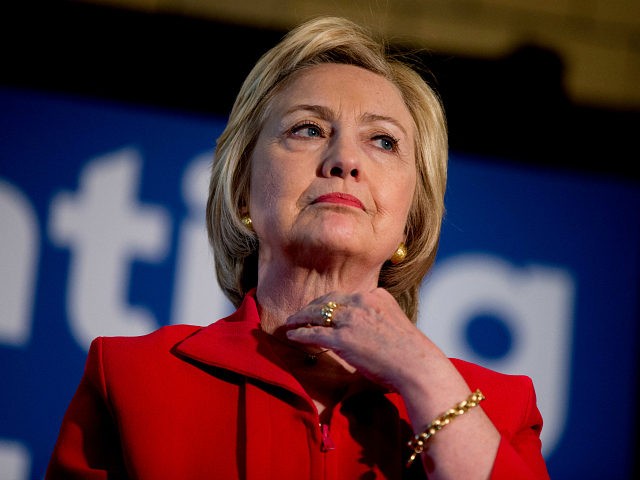Breitbart Senior Editor-at-Large Peter Schweizer, the author of the bestselling book “Clinton Cash” and narrator of the new documentary of the same name, writes in Politico Magazine about the “strange gaps” in Hillary Clinton’s email history and what could be missing.
The past few weeks have brought a myriad of revelations about the private server Hillary Clinton used while she was secretary of state. First, there was the State Department inspector general’s devastating critique of the former secretary’s email practices. Then came sworn testimony of two key Clinton aides about how the server was set up and how the system worked (or didn’t). Just this weekend, Clinton met with the FBI to discuss her email arrangements. And on Tuesday, FBI Director James Comey announced that the agency would not recommend criminal charges over the handling of these emails, while at the same time offering a brutal assessment of how poorly Team Clinton handled classified information.
But, when it comes to Clinton’s correspondence, the most basic and troubling questions still remain unanswered: Why are there gaps in Clinton’s email history? Did she or her team delete emails that she should have made public?
The State Department has released what is said to represent all of the work-related, or “official,” emails Clinton sent during her tenure as secretary—a number totaling about 30,000. According to Clinton and her campaign, when they were choosing what correspondence to turn over to State for public release, they deleted 31,830 other emails deemed “personal and private.” But a numeric analysis of the emails that have been made public, focusing on conspicuous lapses in email activity, raises troubling concerns that Clinton or her team might have deleted a number of work-related emails.
We already know that the trove of Clinton’s work-related emails is incomplete. In his comments on Tuesday, Comey declared, “The FBI … discovered several thousand work-related e-mails that were not in the group of 30,000 that were returned by Secretary Clinton to State in 2014.” We also already know that some of those work-related emails could be permanently deleted. Indeed, according to Comey, “It is also likely that there are other work-related e-mails that [Clinton and her team] did not produce to State and that we did not find elsewhere, and that are now gone because they deleted all emails they did not return to State, and the lawyers cleaned their devices in such a way as to preclude complete forensic recovery.”
Why does this matter? Because Clinton signed documents declaring she had turned over all of her work-related emails. We now know that is not true. But even more importantly, the absence of emails raises troubling questions about the nature of the correspondence that might have been deleted.
Based on the emails the State Department released, Clinton sent or received an average of 21 work emails per day during her tenure—including on her numerous trips overseas, when email must have been a lifeline for communication. But there are numerous odd low-traffic days in the email record during her foreign travel. For example, from July 17-23, 2009, Clinton made a high-profile visit to India and Thailand. She not only issued a pivotal joint statement with the Indian government on nuclear technology, she also met with Indian billionaires at the start of her visit. On July 22, she met with Russian Foreign Minister Sergei Lavrov in Thailand to discuss arms control. And yet, if you look at what she claims is her complete email record released by the State Department, on July 18 and July 20 of this trip, she did not send or receive a single email that was deemed work-related.
[…]
But then there is an instance where the State Department cable traffic rises and there are few if any Clinton corresponding emails. It’s the case of Rosatom, the Russian State Nuclear Agency: Clinton and senior officials at the State Department received dozens of cables on the subject of Rosatom’s activities around the world, including a hair-raisingcable about Russian efforts to dominate the uranium market. As secretary of state, Clinton was a central player in a variety of diplomatic initiatives involving Rosatom officials. But strangely, there is only one email that mentions Rosatom in Clinton’s entire collection, an innocuous email about Rosatom’s activities in Ecuador. To put that into perspective, there are more mentions of LeBron James, yoga and NBC’s Saturday Night Live than the Russian Nuclear Agency in Clinton’s emails deemed “official.”
What could explain this lack of emails on the Russian Nuclear Agency? Were Clinton’s aides negligent in passing along unimportant information while ignoring the far more troubling matters concerning Rosatom? Possibly. Or, were emails on this subject deleted as falling into the “personal” category? It is certainly odd that there’s virtually no email traffic on this subject in particular. Remember that a major deal involving Rosatom that was of vital concern to Clinton Foundation donors went down in 2009 and 2010. Rosatom bought a small Canadian uranium company owned by nine investors who were or became major Clinton Foundation donors, sending $145 million in contributions. The Rosatom deal required approval from several departments, including the State Department.
Read the rest at Politico.

COMMENTS
Please let us know if you're having issues with commenting.